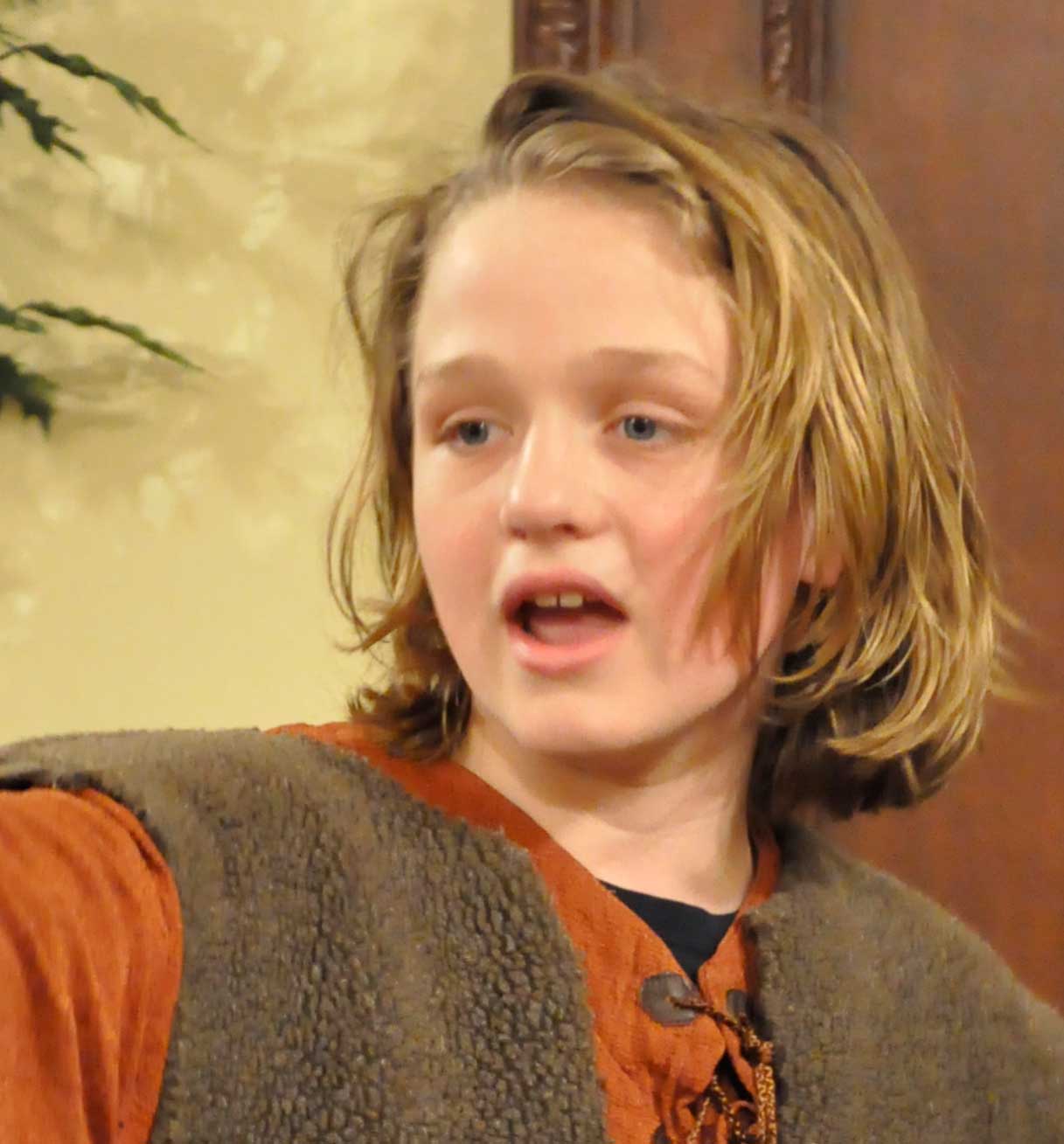Typewriter (by Henry P – 8th grade)
 [After reading Henry’s story, read the preview article from The Bulletin Magazine about the making of “Typewriter,” written by Language Arts teacher Rosemary Hester]
[After reading Henry’s story, read the preview article from The Bulletin Magazine about the making of “Typewriter,” written by Language Arts teacher Rosemary Hester]
When he entered the room, he tripped over an overturned lamp and fell face first onto the carpet. The first thing he noticed wasn’t that his money and his TV had been taken, no, he was looking at the empty spot on his desk where his typewriter used to be. He was midway through a sentence — he knew how hard it would be to pick up that train of thought again. At least they hadn’t taken his manuscripts. Probably because his handwriting was so indiscernible that on the surface, it just looked like a bunch of gibberish. If they knew who he was, they probably would have left the TV alone and just taken the typewriter and the manuscripts.
The next morning, he bought himself a new typewriter. He had to pick his typewriters carefully, because this was the thing that he would be spending a good portion of the next few months with.
He had already looked at a couple, but one particular one, painted blood red, caught his eye. The second he felt its keys under his fingers, ideas began flowing. He knew this was the one. He shoved it across the counter and forked over the money to the cashier.
He ran as fast as he could back to his hotel, and he was out of breath when he finally made it to his door.
He put the typewriter down on the desk, with care. He grabbed a piece of paper off the floor and shoved it into the typewriter. His hands fell into their comfortable position and he began typing.
He sat there from 1:00 p.m. to 12:00 a.m. When he finally he stopped, he realized he could barely move and had to do stretches to walk. From 1:30 a.m. to 2:15 a.m. he walked around the hotel, brainstorming. When he got back into the room at 2:20 a.m., he tripped over the lamp again and hit the carpet. This time when he hit the carpet, he was out for the night.
That night he had a bizarre dream. He was sitting at the desk, typing. He had just finished Chapter One, and he felt he deserved a break, but when he tried to pull away from the typewriter, he realized he couldn’t. His fingers were glued to the keys. He tried to rip his fingers off the typewriter, but all he did was make the hold on his fingertips even tighter. A cold sweat broke out on his brow. His fingers began to type for themselves: CHAPTER TWO….
His fingers began to bleed over the keys. His face got as red as a beet and he felt as if his brain could explode at any second. Blood began to drip over the sides of the typewriter, disappearing into the red paint.
CHAPTER THREE….
He screamed as the skin on his fingers began to rip and…
He woke up, breathing in the hotel carpet stench. He was sweating. He went down to the nearest diner and ate a stack of pancakes drowned in artificial maple syrup. He kept on looking at his fingers, thinking of the skin being ripped off of them. When he got back to the room, he was hesitant to touch those keys again. Like a kid afraid of the dark, he just wanted to crawl under the covers. Eventually he coaxed himself back to adulthood.
“You’re a writer, this is what you do.”
When his fingers finally felt those keys again, he felt instantly ashamed of wasting so much time with his childish fears, he immediately picked up his groove again.
By 3:00 a.m., his eyes had become useless and his fingers had taken over, but he actually made it to Chapter Four. When his fingers had become as useless as his eyes, he finally decided to call it a day and he fell asleep in his chair, drooling like a baby.
That night he had another dream; in this one his fingers weren’t stuck to the typewriter. He was lying in a cramped little cage, like a dog in a carrier. On the table across from him the typewriter sat, facing him. It seemed to be sneering.
He was crying, yelling at the typewriter.
“Please, just let me out.”
The typewriter sat there for a second, then the N key moved down, then the O key moved down.
Once he saw this little word, he wailed in despair, rattling the cage, screaming at the top of his lungs.
He woke up, spittle on his mouth, hovering over the typewriter. His eyes slowly flickered open, and once they adjusted, the first thing he saw was the blood red typewriter.
He leaped back and his chair fell against the floor, knocking his head back onto the carpet. He rolled onto his side, wincing and cupping his head in his hands.
That morning he took the typewriter back to the shop. The cashier gave him a knowing look. He found another typewriter, a bland looking one, the blandest he could find in fact, and took it back with him. He didn’t feel the excitement or the pure creative rush the red typewriter had given him, and once he touched the keys he immediately felt a sense of disappointment.
That night he only wrote thirteen pages, and went to sleep at 10:50 p.m. His sleep was uneventful, and when he woke up, it was in the bed for a change. Despite these perks, he just didn’t feel himself being drawn to this bland little typewriter, he didn’t feel the urgency of the blood red typewriter. In fact, when he looked at the typewriter that morning, the first words that popped into his heads were: “I wonder if Denny’s is packed today.”
It was a weekday, so it wasn’t packed. He ate his usual, a stack of pancakes drowned in fake maple syrup. The syrupy mess tasted like trash, as per-usual, but as he knew all too well, old habits die hard.
While he was sitting there, eating his pancakes, he thought long and hard. He thought about the sentimental garbage he had written last night. He thought about the way that bland typewriter made him feel, like a hack. Then he thought about how the blood red typewriter made him feel. Maybe like Anthony Burgess writing “A Clockwork Orange,” thinking he was going to die from a brain tumor, putting his all on the page.
He went to the shop that morning, looking for the blood red typewriter. He couldn’t find it and he asked the cashier where it was.
“Threw it away. Seems like a perfectly fine typewriter to me, but every person I’ve seen buy it, has returned it, like the Devil’s trapped inside of it or something.”
“Do you have any idea where you threw it out?”
“Dumpster out back”.
He ran to the back and hopped into the dumpster. He rummaged through soda cans and magazines until he found it, lying there. The one beautiful thing in a mound of rubbish. He pulled a banana peel out of its machinery and jumped out of the dumpster.
He raced back to the hotel room, feeling that rush again. He took the bland typewriter and threw it unceremoniously into the waste bin. He cleared the space where the almighty blood red typewriter would sit, and placed it down with the upmost care.
He sat there typing from 11:25 a.m. to 4:30 a.m., a record for him. Eventually, his fingers felt about as inanimate as the typewriter, and his eyes slowly melted and closed. Suddenly, he felt a rush of pain through his fingers and he jolted and his eyes burst open.
Just another dream, he thought. It just one of the side effects of creativity. Deal with it. His fingers began to type.
“It’s not a dream,” his fingers typed out.
His fingers started to type again.
“And it’s not your creativity…”
He began to feel a little uneasy.
“It’s mine.”
He was reminded of the cashier’s comment: “Like the Devil’s trapped inside of it.”
Then he thought of his dreams. If he could slap himself in the face, he would. Those dreams weren’t nightmares, they were signs.
His fingers, now bleeding, began to type again.
“Now you’re getting the gist of it.”
Signs of his future.
“Hotter, hotter.”
A slave.
“Burning, burning.”
A slave to an inanimate object.
“Scorching.”
A slave like so many writers before him, whether it was a pencil, a pen, or even a typewriter with the Devil’s soul trapped inside of it, a slave.
He began laughing out loud, almost choking as he was laughing so hard. He laughed until snot came running out of his nose. Then he began crying. Weeping. When he had finally calmed down, his face was wet with tears. He sniffled a little, then moved forward in his chair.
He began typing, the words flowing:
CHAPTER ONE
“…When he entered the room, he tripped over an overturned lamp and fell face first onto the carpet. The first thing he noticed wasn’t that his money and his TV had been taken, no….
THE END
Behind Typewriter by Rosemarie Hester / Middle School Language Arts
For the second time in the last three years, a Rudolf Steiner student has won the Middle School Fiction Writing Award, sponsored annually by the New York Society Library. This year’s winner was Henry Platt, an eighth grade student in Ms. Schneider’s class. His story, “Typewriter,” about an author’s compulsion to write, begins, “When he entered the room, he tripped over an overturned lamp and fell face first onto the carpet. The first thing he noticed wasn’t that his money and his TV had been taken; no, he was looking at the empty spot on his desk where his typewriter used to be.”
Henry’s process toward the award began years ago in Ms. Schneider’s classroom where the love of language was nurtured in many ways, including the important practices of reading logs, composition writing and the spoken word. Building on that solid foundation, the class began to enjoy a steady diet of classic short stories in the sixth grade. The following year, they began to analyze and recreate the short story form itself, experimenting with the elements of description, dialogue, action and inner voice in a gentle—if more systematic—way.
As a seventh grader, Henry wrote an extended story called, “Oldie,” which delighted the class. “It was about a guy who owned a jelly donut shop,” remembered Elham Taher. “Oldie was a young man, who was old beyond his years,” added Sam McCarthy. “He got up every morning to make donuts and went to bed only to wake and do the same thing the next day. His life was monotonous. He was not a complete human being.”
Henry lists Anthony Burgess, Hunter S. Thompson, Cormac McCarthy and Piri Thomas as some of his favorite writers. The inspiration for “Typewriter” came from the novel “Misery” in which an enslaved man was forced to write. Blending the narrator’s dream world with his waking world, Henry walked the line between close satire and Edgar Allen Poe-like horror.
There are many strong writers in Ms. Schneider’s class, writers who have opened themselves to disciplining their talents, following forms, accepting feedback and developing inner guides. The balance between self-expression and self-critique is delicate, but Henry and others are learning it.
Congratulations to the entire community of eighth grade writers who grew together, and special congratulations to Henry for winning the New York Society Library Middle School Fiction Award.

